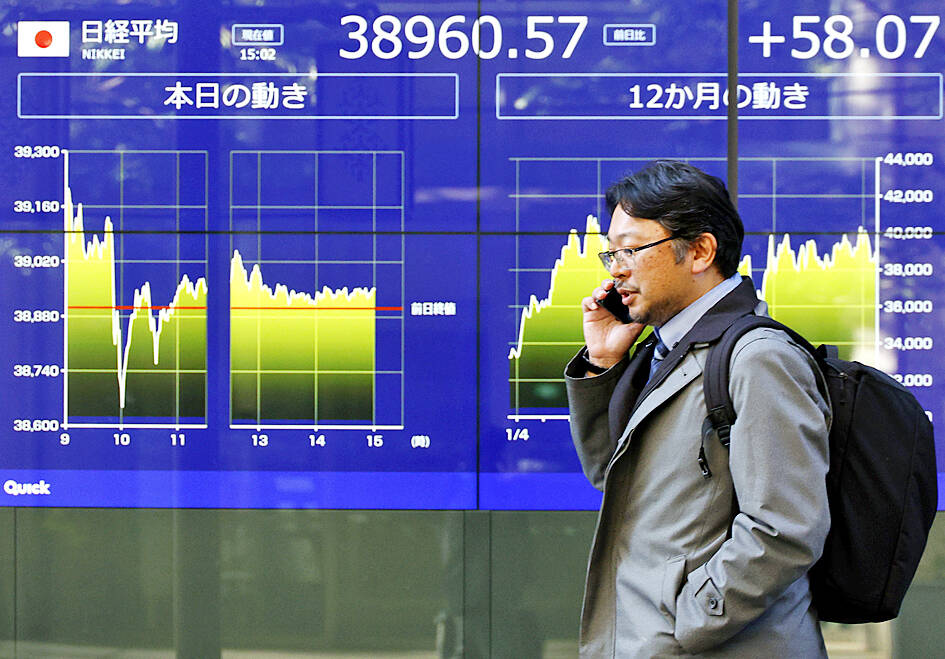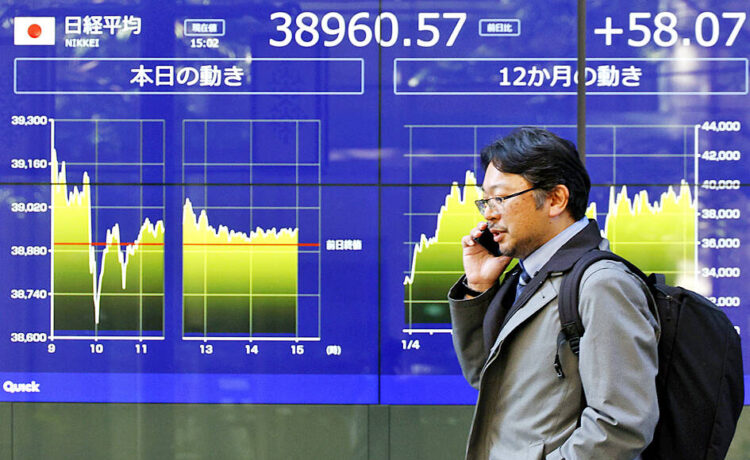CONCERNS:
The new US administration has called for foreign exchange manipulation by other nations to be addressed, with strategists pondering who would be targeted
Asian markets yesterday experienced big fluctuations after US President Donald Trump took office warning he could impose stiff tariffs on Canada and Mexico next month, but appeared to delay any action against China for now.
Trump’s announcement that the nation’s closest neighbors could be hit with 25 percent levies as soon as Feb. 1 also jolted currency markets, with the Mexican peso and Canadian dollar tumbling.
That lack of mention of China fanned hopes the economic superpowers would not embark on another trade dispute, with Beijing yesterday saying that it hoped the two sides could cooperate on the issue.

Photo: EPA-EFE
The TAIEX in Taipei rose 0.14 percent to 23,300.01. Tokyo, Sydney, Bangkok and Jakarta also moved up, while Shanghai, Singapore, Seoul, Wellington, Manila and Mumbai fell.
Hong Kong advanced, with embattled Chinese developer Country Garden Holdings Co (碧桂園) soaring as much as 30 percent at one point as trading in the firm resumed after a nine-month suspension. The shares closed 17.5 percent higher.
London edged up at the open, but Frankfurt and Paris slipped.
The US dollar, which had weakened across the board on Monday, bounced back against its major peers, but its biggest gains were against the Mexican peso and Canadian dollar, with the latter at its weakest since the start of 2020 during the COVID-19 pandemic.
“The new administration seems aware of the potential downsides of tariffs,” JPMorgan Asset Management chief market strategist for Asia-Pacific Tai Hui (許長泰) said. “China, Mexico and Canada remain in the spotlight for possible tariff increases. Investors may need to prepare for some whipsawing of policy announcements in the weeks ahead as the new administration settles on precise policy direction.”
For now, traders are zeroing in on a warning over currency manipulation which might spark greater volatility ahead.
A fact sheet from the new US administration that is yet to be made public has called for key federal agencies to address foreign exchange (FX) manipulation by other nations, prompting strategists to ponder who would be targeted. Japan, China, Germany and Singapore are already on the US Department of the Treasury’s “monitoring list” for currency practices.
Trump’s move comes after high US interest rates and strong growth have kept the US dollar elevated against everything from the euro to the yuan, entrenching its dominance across the foreign exchange market. The prospect of further gains in the greenback is likely to put other nations on guard and might fuel another round of intervention to prop up their currencies.
China, which is already in the cross-hairs for trade tariffs from the US, might be particularly vulnerable, strategists said.
Any new headlines on currency practices could further hurt the yuan.
“Increased US scrutiny on currency policies could pressure countries to allow more FX appreciation against the [US] dollar,” said Chang Wei Liang (張偉亮), a strategist with DBS Bank Ltd. “If there are perceptions of allowing the currencies to weaken in the event of US tariffs in future, then this could raise the currency manipulation question again.”
Additional reporting by Bloomberg





